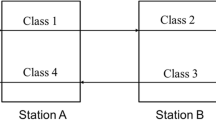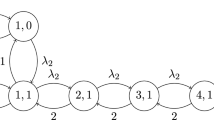Abstract
A sufficient stability condition for the standard token passing ring has been “known” since the seminal paper by Kuehn in 1979. However, this condition was derived without formal proof, and the proof seems to be of considerable interest to the research community. In fact, Watson observed that in the performance evaluation of token passing rings, “it is convenient to derive stability conditions ... (without proof)”. Our intention is to fill this gap, and to provide a formal proof of thesufficient and necessary stability condition for the token passing ring. In this paper, we present the case when the arrival process to each queue is Poisson but service times and switchover times are generally distributed. We consider in depth a gatedl-limited (l≤ ∞) service discipline for each station. We also indicate that the basic steps of our technique can be used to study the stability of some other multiqueue systems.
Similar content being viewed by others
References
S. Asmussen,Applied Probability and Queues (Wiley, Chichester, 1987).
O.J. Boxma and W.P. Groenendijk, Two queues with alternating service and switching times, in:Queueing Theory and its Applications — Liber Amicorum for J.W. Cohen, ed. O.J. Boxma and R. Syski (North-Holland, Amsterdam, 1988), pp. 261–282.
L. Breiman,Probability (Addison-Wesley, Reading, MA, 1968).
K.L. Chung,Markov Chains with Stationary Transition Probability (Springer, 1967).
E. Coffman, Jr. and E. Gilbert, A continuous polling system with constant service time, IEEE Trans. Inf. Theory IF-32(1986)584–591.
M. Eisenberg, Queues with periodic service and changeover time, Oper. Res. 20(1972)440–451.
G. Fayolle, On random walks arising in queueing systems: Ergodicity and transience via quadratic forms as Lyapunov functions, Part I, Queueing Systems 5(1989)167–184.
L. Georgiadis and W. Szpankowski, Stability criteria for yet another multidimensional distributed system, Purdue University, CSD-TR-91-071 (1991).
O. Ibe and X. Cheng, Stability conditions for multiqueue systems with cycle service, IEEE Trans. Auto. Control AC-33(1988)102–103.
M. Karatzoglu and A. Ephremides, Ergodicity ofM-dimensonal random walks and random access systems, Preprint (1989).
L. Kleinrock and H. Levy, The analysis of random polling systems, Oper Res. 36(1988)716–732.
P. Kuehn, Multiqueue systems with nonexhaustive cycle service, Bell Syst. Tech. J. 58(1979)671–698.
H. Levy, M. Sidi and O.J. Boxma, Dominance relations in polling systems, Queueing Systems 6(1990)155–172.
R. Loynes, The stability of a queue with non-independent inter-arrival and service times, Proc. Cambridge Phil. Soc. 58(1962)497–520.
V.A. Malyshev, Classification of two-dimensionl positive random walks and almost linear semimartingales, Dokl. Akad. Nauk SSR 22.3(1972)136–138.
V.A. Malyshev and M.V. Mensikov, Ergodicity, continuity and analyticity of countable Markov chains, Trans. Moscow Math. Soc. (1981) 1–18.
M.V. Mensikov, Ergodicity and transience conditions for random walks in the positive octant of space, Sov. Math. Dokl. 15(1974)1118–1121.
D.R. Miller, Existence of limits in regenerative processes, Ann. Math. Statist. 43(1972)1275–1282.
S. Meyn and R.L. Tweedie, Criteria for stability of Markovian processes I: Discrete time chains, Adv. Appl. Prob. (1992).
M.B. Nevelson and R.Z. Hasminskii,Stochastic Approximation and Recursive Estimation, Vol. 47, American Mathematical Society, Providence RI (1973).
W. Rosenkrantz, Ergodicity conditions for two-dimensional Markov chains on the positive quadrant, Prob. Theory Rel. Fields 83(1989)309–319.
S. Stidham, Jr., A last word onL=λW, Oper. Res. 22(1974)417–421.
W. Szpankowski, Stability conditions for multi-dimensional queueing systems with computer applications, Oper. Res. 36(1988)944–957.
W. Szpankowski, Towards computable stability criteria for some multidimensional stochastic processes, in:Stochastic Analysis of Computer and Communication Systems, ed. H. Takagi (Elsevier Science/North-Holland, 1990), pp. 131–172.
W. Szpankowski, Towards stability criteria for multidimensional distributed systems: The buffered ALOHA case, CSD TR-983, Purdue University (1990); revised (1991).
H. Takagi,Analysis of Polling Systems (MIT Press, Cambridge, MA, 1986).
H. Takagi, Queueing analysis of polling models, ACM Comput. Surveys 20(1988)5–28.
R.L. Tweedie, Criteria for classifying general Markov chains, Adv. Appl. Prob. 8(1976)737–771.
J. Walrand,An Introduction in Queueing Networks (Prentice Hall, New Jersey, 1988).
K. Watson, Performance evaluation of cyclic service strategies-A survey,Proc. PERFORMANCE'84, Paris, ed. E. Gelenbe (1984).
Author information
Authors and Affiliations
Additional information
This research was supported by NSF Grant CCR-8900305, and in part by AFOSR Grant 90-0107, and by Grant R01 LM05118 from the National Library of Medicine.
Rights and permissions
About this article
Cite this article
Georgiadis, L., Szpankowski, W. Stability of token passing rings. Queueing Syst 11, 7–33 (1992). https://doi.org/10.1007/BF01159285
Received:
Revised:
Issue Date:
DOI: https://doi.org/10.1007/BF01159285




